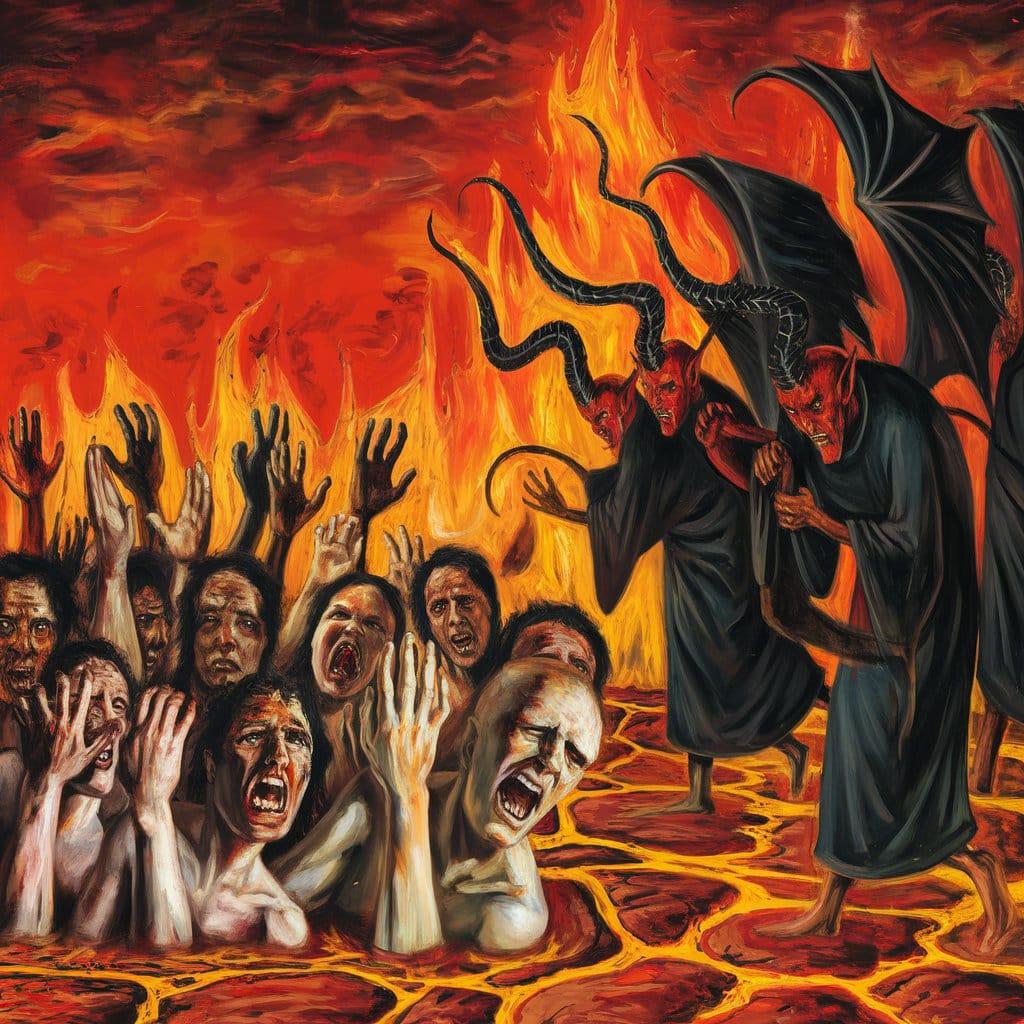
biblical meaning of hell
The concept of hell is a topic that has intrigued and troubled humanity for centuries. In the Bible, hell is portrayed in various ways, reflecting a range of interpretations and understandings across different Christian denominations. This article aims to explore the biblical meaning of hell, examining its scriptural basis, interpretations, and implications for believers today.
Understanding Hell in the Bible
The term “hell” is often used to describe a place of punishment for the wicked. However, the biblical meaning of hell is nuanced, with different words and descriptions used throughout scripture. In the Old Testament, the Hebrew word “Sheol” refers to a shadowy place of the dead, while the New Testament employs several Greek terms, such as “Hades” and “Gehenna,” to describe places associated with punishment.
Sheol: The Old Testament Perspective
In the Old Testament, Sheol is not specifically a place of torment; rather, it represents the grave or the realm of the dead. It is often depicted as a place of darkness where both the righteous and the unrighteous go after death. For example, in Genesis 37:35, Jacob mourns for Joseph, saying, “I will go down to Sheol to my son, mourning.” This illustrates that Sheol is seen as a place of existence, albeit one devoid of joy and life.
Hades: The New Testament Perspective
The New Testament introduces the term “Hades,” which is often viewed as a temporary holding place for the dead. In Luke 16:23, Jesus describes a rich man in Hades, where he experiences torment. This narrative emphasizes the distinction between the righteous and the wicked, suggesting a level of consciousness and suffering for the latter.
Gehenna: A Place of Eternal Punishment
Gehenna is another term used in the New Testament that is often associated with hell. Originally, Gehenna was a valley outside Jerusalem where waste was burned, symbolizing destruction and defilement. Jesus uses this term to describe a place of eternal punishment for the wicked in passages such as Matthew 10:28, where He warns, “Do not fear those who kill the body but cannot kill the soul. Rather, fear him who can destroy both soul and body in hell (Gehenna).” This highlights the seriousness of eternal separation from God.
Theological Interpretations of Hell
The biblical meaning of hell has led to various theological interpretations among Christian denominations. Here are some of the most prominent views:
Traditional View
The traditional view posits that hell is a place of eternal conscious torment for those who reject God. This interpretation is supported by passages like Revelation 20:10, which describes the devil being thrown into the lake of fire, along with those whose names are not written in the Book of Life. Proponents of this view argue that the imagery of fire and torment underscores the seriousness of sin and the consequences of rejecting God.
Conditionalism
Conditionalism, also known as annihilationism, suggests that the wicked will not endure eternal torment but will be ultimately destroyed or cease to exist. Advocates of this view cite verses like Matthew 10:28 and Romans 6:23, which speaks of the “wages of sin” as death rather than eternal suffering. This perspective emphasizes God’s justice and mercy.
Universalism
Universalism is the belief that ultimately all people will be saved, and hell is not a permanent state. This view argues that God’s love and grace will eventually reconcile all of creation to Himself. Proponents often reference Philippians 2:10-11, which states that every knee shall bow to Jesus. However, this view is controversial and not widely accepted among traditional Christian denominations.

The Implications of Hell in Christian Life
The biblical meaning of hell carries significant implications for Christians. Understanding hell as a reality impacts how believers approach their faith, evangelism, and moral living.
Motivation for Evangelism
The belief in hell can motivate Christians to share their faith with others. The urgency to rescue others from eternal separation from God drives evangelistic efforts. As stated in Mark 16:15, Jesus commands His followers to “go into all the world and proclaim the gospel to the whole creation.” This mission is rooted in the desire to save souls from the fate of hell.
Moral Accountability
Belief in hell also instills a sense of moral accountability. Christians are called to live in a manner that reflects their faith and values. The teachings of Jesus emphasize love, compassion, and righteousness, reminding believers of the consequences of sin and the importance of repentance. In Galatians 6:7, Paul writes, “Do not be deceived: God is not mocked, for whatever one sows, that will he also reap.” This underscores the reality of divine justice.
The Comfort of God’s Justice
For many believers, the existence of hell serves as a comfort, affirming God’s justice in the face of evil. It reassures them that God will ultimately right wrongs and hold individuals accountable for their actions. This belief can provide solace in a world filled with injustice and suffering.
Common Misconceptions About Hell
Several misconceptions about hell persist in popular culture and even among Christians. Addressing these misconceptions can provide clarity and understanding.
Myth: Hell is a Place Created by Satan
Many people believe that Satan rules hell and that it is a place of endless partying for the wicked. However, according to the Bible, hell is primarily a place of punishment created by God for the devil and his angels. In Matthew 25:41, Jesus refers to hell as “the eternal fire prepared for the devil and his angels,” indicating that it is not a realm of fun but of suffering.
Myth: Everyone Goes to Hell
Another common misconception is that everyone, regardless of their choices in life, will end up in hell. The Bible teaches that hell is reserved for those who reject God and persist in sin. In John 3:36, it is stated that “whoever believes in the Son has eternal life; whoever does not obey the Son shall not see life, but the wrath of God remains on him.” This emphasizes the importance of faith and obedience to God.
Myth: Hell is Not Mentioned in the Bible
Some argue that the concept of hell is a later addition to Christian theology and is not present in the Bible. However, as demonstrated throughout this article, various scriptures address the reality of hell, highlighting its significance within the biblical narrative. Understanding these passages is essential for grasping the full scope of biblical teachings on the afterlife.

Conclusion
The biblical meaning of hell is a profound and complex topic that warrants careful consideration and understanding. Whether viewed as a place of eternal torment, a temporary holding ground, or a metaphor for separation from God, the implications of hell influence how Christians live out their faith. By exploring the scriptural foundations and interpretations of hell, believers can cultivate a deeper understanding of God’s justice, mercy, and the call to share the gospel with others.
Frequently Asked Questions (FAQ)
1. What is the biblical definition of hell?
The biblical definition of hell encompasses several concepts, primarily as a place of punishment for the wicked, often associated with eternal separation from God. It is depicted through terms such as Sheol, Hades, and Gehenna in scripture.
2. Does everyone go to hell according to the Bible?
No, the Bible teaches that hell is reserved for those who reject God and persist in sin. Believers in Christ are promised eternal life with God, while those who choose to separate themselves from Him face the consequences of their choices.
3. How can I avoid hell according to the Bible?
The Bible emphasizes faith in Jesus Christ as the path to salvation. By accepting Christ as Lord and Savior, repenting of sins, and following His teachings, individuals can receive the promise of eternal life.
4. Is hell mentioned in the Old Testament?
Yes, the concept of hell is present in the Old Testament primarily through the term Sheol, which refers to the grave or the realm of the dead, rather than a place of eternal torment.
5. What do different Christian denominations believe about hell?
Christian denominations vary in their beliefs about hell. The traditional view sees it as a place of eternal torment, while conditionalism posits that the wicked will be annihilated. Universalism suggests that all will ultimately be saved.








